Der FC St. Pauli verliert nicht unverdient das Stadtderby im Volksparkstadion. Er verliert es vor allem deshalb, da es das Team von Timo Schultz erst spät schaffte, Spielkontrolle zu erlangen. In einem Spiel, welches von Umschalt- und Standardsituationen bestimmt war, gelang es dem HSV die Abläufe des FCSP zu stören und so immer wieder gefährlich zu werden. Zwar tut diese Niederlage weh, aber der Blick richtet sich nur nach vorne.
(Titelbild: Peter Böhmer)
MillernTon-Kollege Maik war im Stadion und hat bereits kurz nach Abpfiff einen Kurzbericht veröffentlicht, den ich euch empfehlen möchte, vor allem, wenn ihr den Spielverlauf noch einmal rekonstruieren wollt.
Die Aufstellung
…war aus Sicht des FC St. Pauli wenig überraschend: Abgesehen von Nikola Vasilj, der Pokal-Torwart Dennis Smarsch ersetzte, lief das gleiche Team wie beim Pokalspiel gegen Borussia Dortmund auf. Das bedeutete auch, dass Daniel-Kofi Kyereh nicht startete. Er war nicht einmal im Kader dabei. Kyereh war erst am Donnerstag vom Africa-Cup zurückgekehrt und dürfte sich nun erst einmal von den Strapazen erholen.
Auch der HSV wechselte nur einmal im Vergleich zum erfolgreichen Pokalspiel in Köln: Der sympathische HSV-Trainer Tim Walter brachte anstelle von Manuel Wintzheimer den schnellen Bakery Jatta auf der offensiven Außenbahn.
Wie erwartet ordnete sich der FC St. Pauli in einem 4-4-2 an. Offensiv soll das ganze dann ja wieder eine Raute werden, hatte Timo Schultz auf der PK nach dem Dortmund-Spiel gesagt. Allerdings sah man auch gegen den HSV wenig davon, da der FCSP zu selten in Ruhe aufbauen konnte. Der HSV ordnete sich, ebenfalls erwartbar, in einem 4-3-3 an.
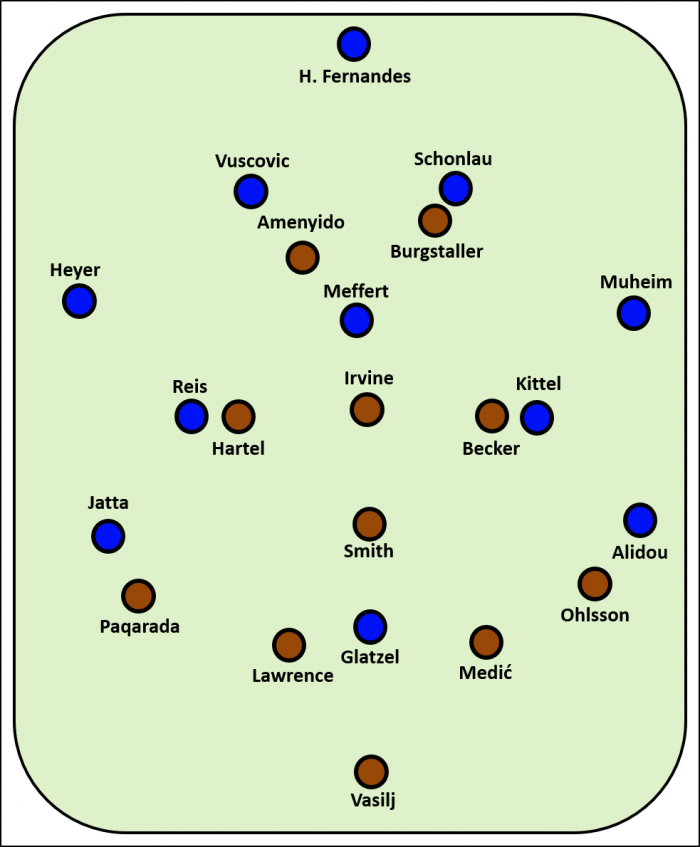
Druck, Druck, Druck… und Fehler
Direkt in den ersten Minuten zeigte der HSV, dass er gar kein Interesse daran hatte, den FC St. Pauli auch nur eine Sekunde lang irgendwo auf dem Platz Ruhe im Spielaufbau zu geben. Alle Feldspieler, ab und an mit Ausnahme der Innenverteidiger, wurden immer wieder sehr aggressiv angelaufen und damit massiv unter Druck gesetzt.
Der FC St. Pauli zeigte sich davon in den ersten Sekunden des Spiels beeindruckt, konnte sich anfangs selten befreien und die erste Pressinglinie des HSV überspielen. Das Problem: Meist ging der Ball genau in der Phase verloren, als sich alles nach vorne bewegte, weil der erste Druck überspielt schien. So konnte dann der HSV seinerseits schnell umschalten und gefährlich werden (ein Beispiel von vielen ist die erste Chance des Spiels durch Alidou in der dritten Minute).
Fünf Torschüsse gab es vom HSV allein in den ersten zehn Minuten. Der FC St. Pauli überstand diese Phase recht glücklich ohne Gegentor. Aber es gab einige brenzlige Situationen, auch im eigenen Spielaufbau, in denen das Team ungewohnt fehlerhaft agierte (z.B. Smith und Paqarda, die Pässe direkt in die Füße der Gegner spielten). Das hohe Pressing des HSV, es machte sich bezahlt. Dem HSV gelang es, besonders die Außenverteidiger des FCSP massiv unter Druck zu setzen und dadurch das Aufbauspiel entscheidend zu stören.
Nicht selten in dieser Saison zahlte das Team vom stets freundlichen Trainer Tim Walter einen hohen Preis für das hohe Pressing, da es Teams immer wieder gelang, das Pressing zu überspielen. Denn trotz des hohen Drucks und der anfänglich vielen Chancen war auch klar: Wenn es dem FC St. Pauli gelingen würde die eigene Stärke in offensiven Umschaltmomenten auszuspielen (oder aber im kontrollierten Spielaufbau), dann dürfte es sehr unangenehm für den HSV werden.
Das gelang dann nach den ersten zehn Minuten häufiger. Zwar konnte der FC St. Pauli auch weiterhin nicht auf seine gewohnten Abläufe im Spielaufbau zugreifen, aber trotz hohen Drucks wurde der Ball häufiger kontrolliert nach vorne gebracht.
Diese Spielweise beider Teams, mit hohem Druck und dem Fokus auf Umschaltsituationen, sie machten das Spiel sehr intensiv. Denn wenn der FC St. Pauli das Pressing überspielen konnte, dann war der Ball zu oft schnell wieder weg und der HSV konnte seinerseits umschalten. Entsprechend war zu jeder Zeit und fast an jedem Ort auf dem Spielfeld höchstes Tempo angesagt (im Spielaufbau hatten die Innenverteidiger des HSV etwas mehr Zeit). So zeigte der FC St. Pauli immer gute Ansätze, kam aber zu selten darüber hinaus und konnte sich nur selten Torchancen erspielen.
Nach dem Spiel brachte Marcel Hartel genau dieses Problem seines Teams auf den Punkt: „Der HSV hat uns sehr, sehr gut unter Druck gesetzt. Wir haben da nicht unsere spielerischen Möglichkeiten gefunden. Wir hatten in den Umschaltbewegungen nicht so die Konsequenz nach vorne, wenn wir den Ball mal gewonnen haben. Da war der Ball schnell wieder beim HSV und so haben wir ihn dann auch stark gemacht.„
Wenn es aus dem Spiel heraus nicht klappt…
Und was macht man dann, wenn das eigene Spiel etwas unrund daherkommt? Richtig, man nutzt die erstbeste Gelegenheit nach einem Standard. Der HSV hatte in den ersten Minuten nach Ecken schon einige klare Torchancen, ließ diese aber liegen. Besser machte es der FCSP nach einem Freistoß, der eigentlich etwas zu lang getreten war. Etienne Amenyido konnte den Ball aber zurückbringen und Guido Burgstaller gelang etwas, was ich nicht für möglich gehalten habe: Er erzielte ein Derby-Tor aus noch weniger Zentimetern Entfernung zur Torlinine, als es Gerald Asamoah 2011 gelungen war. Ja, die Führung war nicht so richtig verdient, der HSV hatte mehr Chancen. Aber das war mir und sicher auch allen anderen, die es mit dem FCSP halten, natürlich völlig wumpe.
Der charmante HSV-Trainer Tim Walter hatte auf der PK vor dem Spiel gesagt, dass er aus dem Hinspiel keine Lehren ziehen könne, da sich sein Team weiterentwickelt habe. Diese Weiterentwicklung ist aus meiner Sicht eine Art Schritt zurück, hin zu einer konservativeren Spielweise. Tim Walter war bisher immer mit äußerst radikalem Fußball auffällig geworden. Gerade seine Defensivspieler wurden bisher meist dazu angehalten, ihre Positionen immer wieder aufzulösen, um eine Überzahl im Mittelfeld zu generieren. Die Spiele des HSV wurden dadurch zuweilen etwas wirr, aber auch unglaublich aufregend. Der Fußball sah toll aus, aber es gelang zu selten daraus auch das entsprechende Kapital zu schlagen, ohne sich auf der Gegenseite gefährliche Konter zu fangen.
Gegen den FC St. Pauli war von dieser Radikalität, von dem sogar international beachteten „Walter-Ball“ fast nichts mehr zu sehen. Defensive Positionen wurden nicht mehr aufgelöst, um Überzahl zu erschaffen, das extreme Risiko wurde nicht mehr gegangen. Das ist nur im weitesten Sinne eine Weiterentwicklung, wie Walter es selbstbewusst nennt. Ich würde es nämlich eher als Schritt zurück zu einem konservativen Ansatz bezeichnen. Das meine ich gar nicht negativ, denn ganz offensichtlich ist das jetzige Spiel ziemlich perfekt auf den Kader zugeschnitten. Mit den beiden unfassbar schnellen Außenspielern Jatta und Alidou, sowie den spielfreudigen und technisch überragenden Achtern Kittel und Reis, ist es Walter möglich, auch ganz ohne radikale Mittel Spielsituationen in der Offensive zu lösen. Kittel und Reis bewegen sich häufig mit auf die Außenbahn und überladen diese dann. Durch das enorme Tempo von Jatta/Alidou, haben gegnerische Teams Probleme mit der Zuordnung, da sie in jedem Fall vermeiden sollten, dass die offensiven Außen im Rücken der Außenverteidiger Raum haben. Eine weitere Überladung des Raumes scheint da nicht zwingend nötig.
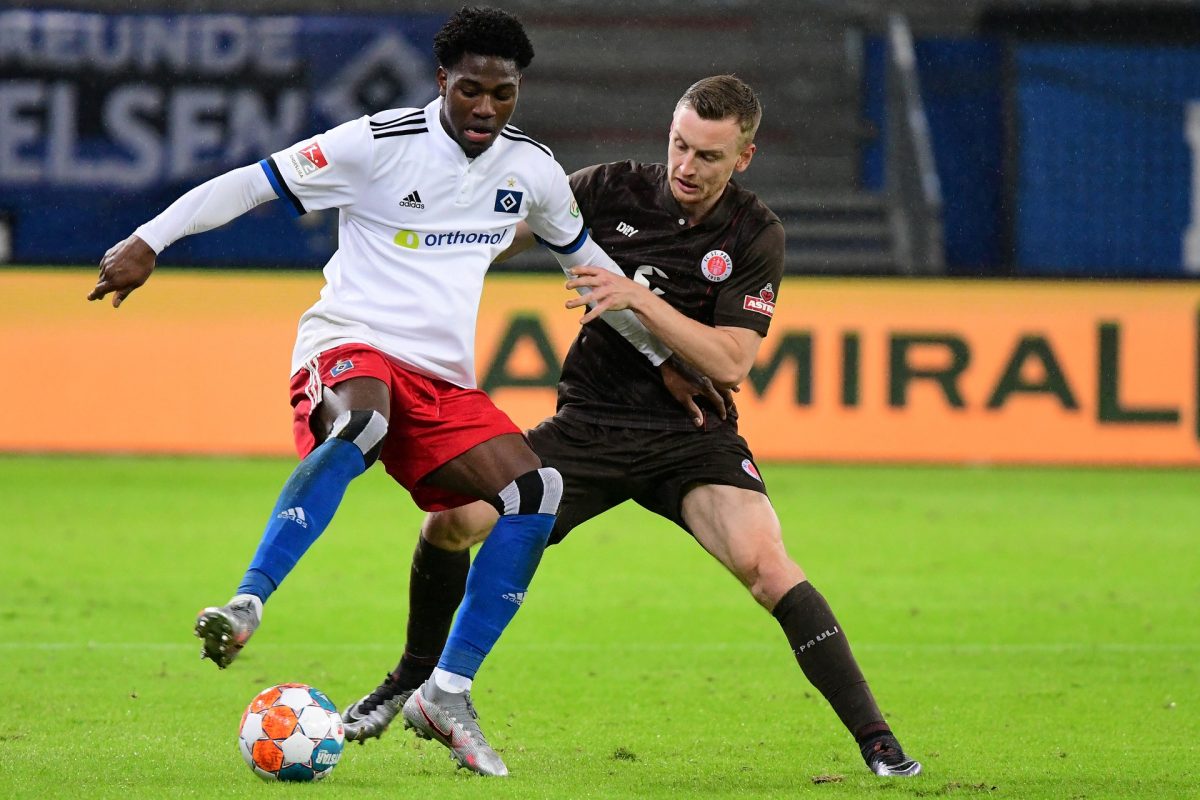
Ja, der HSV ist stärker geworden als noch in der Hinrunde. Das muss man klar anerkennen. Der FC St. Pauli traf das erste Mal in dieser Saison auf einen Gegner, der ihnen teilweise überlegen war, obwohl man selbst eine gute Leistung zeigte. Eine Weiterentwicklung ist das allemal. Der krasse „Walter-Ball“, den ich mir gerne angeschaut habe, er scheint aber ein Opfer dieser Entwicklung zu sein.
Zurück zum Spiel:
Nach der Führung konnte der FC St. Pauli das Spiel bis zur Halbzeit deutlich ausgeglichener gestalten. Und der HSV hätte sich nicht beschweren dürfen, wenn es sogar noch einen Elfmeter gegen sie gegeben hätte. Nach einem gelungen Angriff kreuzten sich die Wege von Ohlsson und Alidou im HSV-Strafraum. Alidou traf Ohlsson dabei ziemlich klar am Bein und Ohlsson fiel daraufhin zu Boden. Für mich auch nach mehrmaligem Anschauen der Szene völlig unklar, warum das kein Elfmeter ist. Übrigens gab es im Hinspiel eine ganz ähnliche Szene, als sich die Wege von Jatta und Medić im FCSP-Strafraum kreuzten. Auch damals war das für mich ein klarer Elfmeter. Vielleicht ist es dann sowas wie ausgleichende Gerechtigkeit. Ein 2:0 in dieser Phase hätte aber sicher das Spiel extrem verändert.
Mit einer knappen Führung ging es für den FC St. Pauli in die Pause. Allerdings waren zu diesem Zeitpunkt Etienne Amenyido und Jackson Irvine (völlig zu Unrecht) gelb-verwarnt. Bei der Karte für Irvine war auch der freundliche Tim Walter über die Außenmikrofone zu hören. Das ist ja einer der wirklich sehr wenigen Vorteile, die ein fast leeres Stadion bietet, dass man auch mal die Konversationen von der Bank und auf dem Platz hören kann. War teilweise schönes Kreisliga-Niveau gestern.
2. Halbzeit: Ausgeglichen, trotz zweier HSV-Tore
Zur zweiten Halbzeit kam dann Maximilian Dittgen für Etienne Amenyido ins Spiel. Timo Schultz erklärte das später damit, dass Amenyido in der ersten Halbzeit trotz Torvorlage so seine liebe Mühe und Not mit der Standfestigkeit und den Gegenspielern hatte. Dittgen, so der Plan, sollte tiefe Wege gehen, die der HSV aufgrund seiner hohen Stellung meist bot.
Der Start in die Halbzeit war dann wesentlich ausgeglichener als jener in die ersten 45 Minuten. Statt selbst immer wieder Probleme mit Gegnerdruck im Spielaufbau zu haben, war es nun der HSV, dem es seltener gelang, den Ball gegen hohes Pressing kontrolliert nach vorne zu bekommen. Der FCSP machte das gut, auch wenn das eigene Offensivspiel Luft nach oben hatte. Nun taten sich beide Teams schwer, den Ball und das Spiel längere Zeit zu kontrollieren.
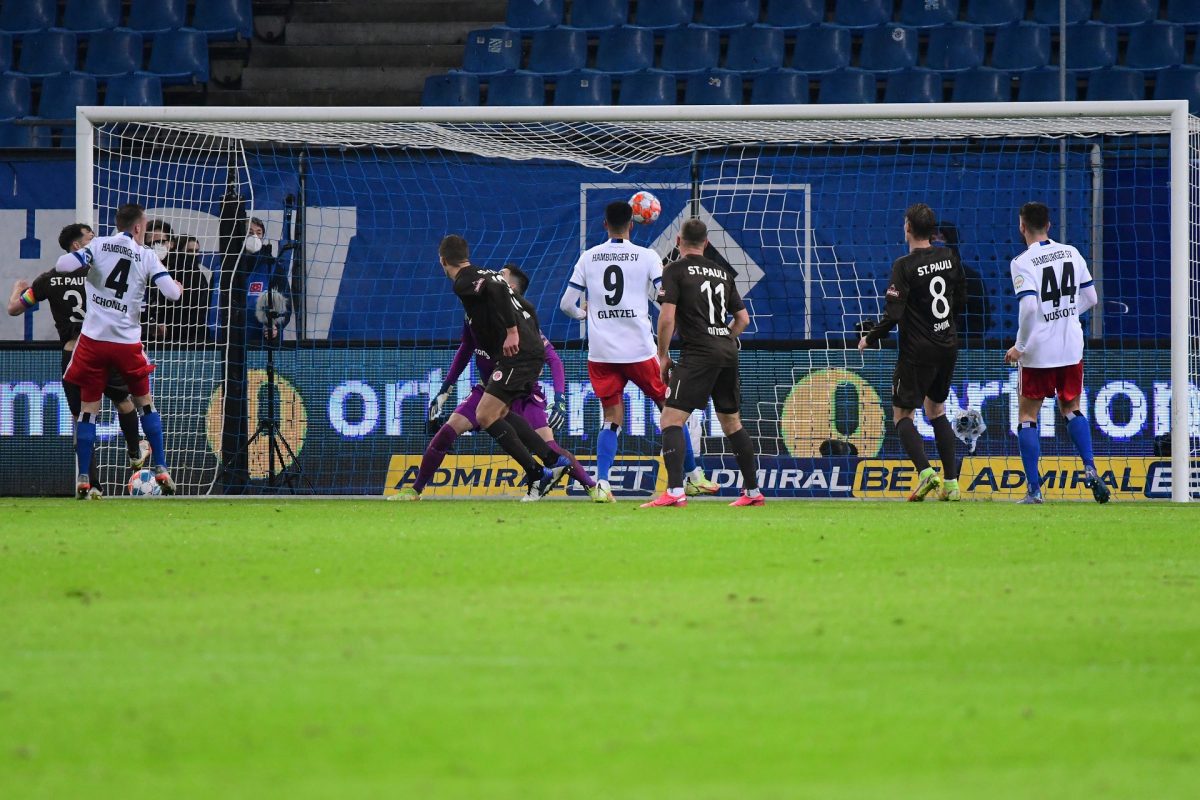
Eine schöne Einzelaktion von Alidou, der anfangs der Halbzeit mit Jatta die Seiten getauscht hatte, führte dann zu einem geblockten Abschluss von Glatzel. Die folgende Ecke ist dann richtig gut von Sonny Kittel getreten, dessen Stärken im Passspiel und bei Standards ja bereits im Vorbericht erwähnt wurden. Der Ball fällt genau zwischen Lawrence und Medić runter, zu weit am ersten Pfosten, als dass Vasilj hätte rangehen müssen oder können. Sebastian Schonlau besetzt diesen Raum zwischen den FCSP-Spielern dann gut – schwupp, steht es 1:1. Das hatte sich in den Minuten zuvor sicher nicht angekündigt, aber betrachtet man das Chancenplus der ersten Halbzeit, war das sicher ein verdienter Ausgleich.
(Schonlau besetzte den Raum ebenso gut, wie ihn Jatta in der ersten Halbzeit besetzte [allerdings vor und nicht hinter Lawrence] – man könnte fast meinen, dass der HSV die Vierer-Raumverteidigung des FCSP bei Ecken vorher analysiert hat.)
Es entwickelte sich nun ein Spiel auf Augenhöhe. Der HSV verlor einiges an seiner vormals guten Struktur und gewann viel seltener die Bälle schnell wieder zurück. Der FC St. Pauli wurde meist immer dann gefährlich, wenn Marcel Hartel beteiligt war. Egal, ob er Pässe abfing oder wichtige Verbindungen zwischen Defensive und Offensive schaffte, Hartel machte einmal mehr ein richtig starkes Spiel aufgrund seiner Ballsicherheit und klugem Stellungsspiel.
Dann kam aber das, was ebenfalls schon in der ersten Halbzeit mehrfach zu Problemen beim FC St. Pauli führte: Auf einen Ballverlust in der Vorwärtsbewegung folgte ein klasse Pass von Kittel auf Jatta, der im Rücken von Paqarada enormes Tempo aufnahm und aus recht spitzem Winkel auf’s Tor schoss – 2:1. Dass dies so passieren könnte, also dass Jatta im Rücken des Außenverteidigers Tempo aufnimmt, war vom FC St. Pauli in Kauf genommen worden. „Einen Tod muss man sterben“ sagt Timo Schultz zu solchen Dingen immer. Denn nur wenn das Team so ein Risiko in Kauf nimmt, ist überhaupt ein eigenes Offensivspiel möglich. Das Gegentor ist natürlich ärgerlich, aber eben auch klasse herausgespielt von Kittel und Jatta. Da kann man dann auch nicht viel gegen machen.
Was der FC St. Pauli aber machen konnte, war sich mit allen verfügbaren Mitteln gegen eine Niederlage zu stemmen, auch wenn es spielerisch mal nicht so gut läuft. Und das taten die Spieler auch. Nach der Führung ließ der HSV immer mehr nach und gab Räume für den FCSP frei. Der FC St. Pauli konnte in den letzten 15 Minuten nochmal richtig Druck aufbauen. Ein Tor fiel jedoch, trotz einiger Chancen, nicht mehr.
Auf Frust folgt Gelassenheit – trotz Schmerz
Im ersten Moment nach Abpfiff war da viel Frust bei mir und ich war der Meinung, dass der FC St. Pauli zu viele Fehler machte und nie zu seinem Offensivspiel gefunden hat, kurzum richtige Scheiße zusammengespielt hat. Ich habe mir das Spiel aber nach zwei Frust-Bieren noch einmal komplett im Re-Live angeschaut. Das mache ich sonst auch immer, aber ich lasse es meist ein wenig nebenher laufen, um mir zwei-drei Szenen und taktische Muster nochmal anzuschauen. Aber dieses Mal war es zwingend nötig, damit ich überhaupt ne Analyse machen konnte, da ich beim Live-Spiel viel zu emotional war. Und nachdem ich das nun noch einmal komplett gesehen habe, bin ich der Meinung, dass der FC St. Pauli ein gutes Spiel gegen den HSV gezeigt hat. Abgesehen von den ersten zehn Minuten, war es ein intensives und ausgeglichenes Spiel, bei dem sich beide Teams entscheidend im Aufbau störten. Die letzte Viertelstunde ging dann sogar klar an den FC St. Pauli. Letztlich verliert der FCSP gegen ein richtig starkes Team, weil irgendwie der letzte Punch vorne gefehlt hat (vielleicht lautet die Antwort hier Daniel-Kofi Kyereh).
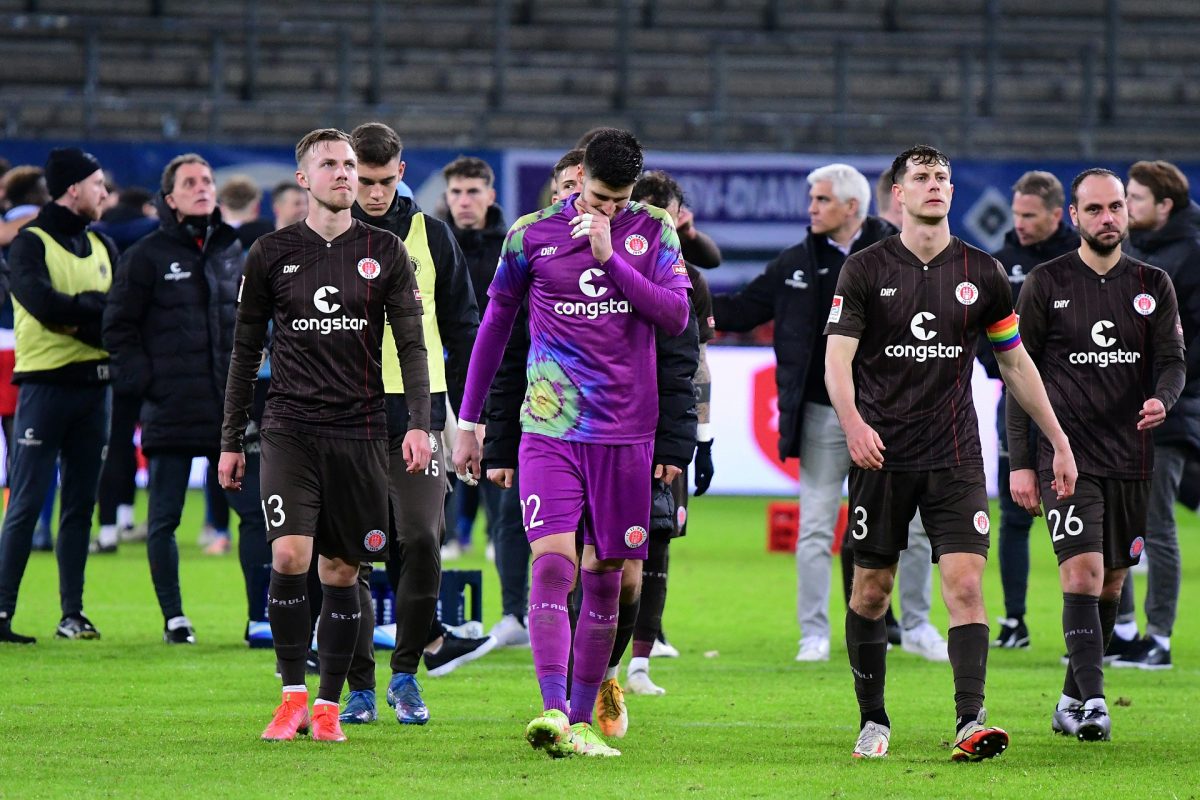
Da ist sie dann also, die Derbyniederlage. War ja klar, dass sie irgendwann kommen würde. Tut richtig weh, muss ich schon zugeben. Ich habe den Stadtmeister-Titel gerne in unseren Reihen gesehen. Aber wenn schon ein Derby verlieren, dann in der jetzigen Situation. Vielleicht ergibt sich ja noch diese Saison die Möglichkeit zur Revanche (am 30. Januar wird das Pokal-Viertelfinale ausgelost).
Anlass zur Sorge, aufgrund von nun vier Spielen in Folge ohne Sieg in der Liga, sehe ich nicht. Da war z.B. die Leistung gegen Kiel vor der Winterpause viel bedenklicher. Beim Derby hat der FC St. Pauli gegen einen starken Gegner in einem größtenteils ausgeglichenen Spiel knapp verloren. Der FC St. Pauli bleibt trotzdem weiterhin auf einem Aufstiegsplatz und hat somit alle Chancen da oben mitzumischen.
Nun wird das alles erstmal aus den Klamotten geschüttelt, dann einmal kräftig durchgeatmet und dann geht es weiter. Es ist alles möglich, was wir uns erträumen können.
Immer weiter vor!
//Tim
Alle Beiträge beim MillernTon sind gratis. Wir freuen uns aber sehr, wenn Du uns unterstützt.
MillernTon auf BlueSky // Mastodon // Facebook // Instagram // Threads // WhatsApp // YouTube
{:}{:en}FC St. Pauli lose the derby at the Volksparkstadion not undeservedly. It loses mainly because Timo Schultz’s team only managed to gain control of the game late on. In a game that was determined by switching and standard situations, HSV succeeded in disrupting FCSP’s processes and thus becoming dangerous time and again. Although this defeat hurts, we can only look forward.
(Cover picture: Peter Böhmer)
MillernTon colleague Maik was at the stadium and published a short report shortly after the final whistle, which I would like to recommend to you, especially if you want to reconstruct the course of the game.
The line-up
…was hardly surprising from FC St. Pauli’s point of view: Apart from Nikola Vasilj, who replaced cup goalkeeper Dennis Smarsch, the same team started as in the cup match against Borussia Dortmund. This also meant that Daniel-Kofi Kyereh did not start. He was not even in the squad. Kyereh had only returned from the Africa Cup on Thursday and is now expected to recover from the exertions.
HSV also made only one change compared to the successful cup match in Cologne: The likeable HSV coach Tim Walter brought in the fast Bakery Jatta on the offensive wing instead of Manuel Wintzheimer.
As expected, FC St. Pauli arranged themselves in a 4-4-2. Timo Schultz had said at the PK after the Dortmund game that the offensive side should be a diamond again. However, there was little of this against HSV, as FCSP was rarely able to build up in peace. HSV, also as expected, arranged themselves in a 4-3-3.

Pressure, pressure, pressure… and mistakes
Directly in the first minutes, HSV showed that they had no interest at all in giving FC St. Pauli even a second of peace anywhere on the pitch in the build-up to the game. All field players, now and then except the centre backs, were repeatedly tackled very aggressively and thus put under massive pressure.
FC St. Pauli was impressed by this in the first few seconds of the game and was rarely able to break free at the beginning and play over HSV’s first pressing line. The problem: Most of the time, the ball was lost exactly in the phase when everything was moving forward because the first pressure seemed to be overplayed. This allowed HSV to switch quickly and become dangerous (one example of many is the first chance of the game by Alidou in the third minute).
HSV had five shots on goal in the first ten minutes alone. FC St. Pauli survived this phase quite fortunately without conceding a goal. But there were some dicey situations, also in their build-up, in which the team made unusual mistakes (e.g. Smith and Paqarada, who played passes directly into the feet of the opponents). HSV’s high pressing paid off. HSV succeeded in putting massive pressure on FCSP’s full-backs in particular and thus decisively disrupted the build-up play.
Not infrequently this season, the team of the always friendly coach Tim Walter paid a high price for the high pressing, as teams repeatedly managed to outplay the pressing. Despite the high pressure and the many initial chances, it was also clear that if FC St. Pauli succeeded in playing to their strengths in offensive switching moments (or in controlled build-up play), then it would be very unpleasant for HSV.
This was achieved more often after the first ten minutes. FC St. Pauli was still not able to use their usual build-up play, but despite high pressure, the ball was moved forward more often in a controlled manner.
This style of play of both teams, with high pressure and the focus on switching situations, made the game very intense. Because when FC St. Pauli was able to overplay the pressing, the ball was too often quickly gone again and HSV was able to transition for its part. Accordingly, at any time and almost at any place on the pitch, the highest tempo was the order of the day (in the build-up to the game, the HSV centre-backs had a little more time). FC St. Pauli always showed good approaches, but rarely went beyond that and could only rarely create scoring chances.
After the game, Marcel Hartel summed up precisely this problem for his team: „HSV put us under very, very good pressure. We didn’t find our playful possibilities. When we won the ball, we didn’t have consistency in our transition movements. The ball was quickly back to HSV and that’s how we made them strong.”
If it doesn’t work out of the game…
And what do you do when your own game is a little rough? Correct, you take the first opportunity after a set piece. In the first minutes, HSV had several clear chances to score from corners but missed them. FCSP did better after a free kick, which was actually a bit too long. But Etienne Amenyido was able to return the ball and Guido Burgstaller managed something that I didn’t think was possible: He scored a derby goal from even fewer centimetres to the goal line than Gerald Asamoah had managed in 2011. Yes, the lead was not really deserved, HSV had more chances. But that didn’t matter at all to me, and I’m sure to everyone else who supports FCSP.
The charming HSV coach Tim Walter had said on the PK before the match that he could not draw any lessons from the first leg, because his team had developed further. In my view, this further development is a kind of a step backwards, towards a more conservative style of play. Tim Walter had always been conspicuous with extremely radical football so far. His defensive players in particular have so far usually been encouraged to break up their positions time and time again to generate an excess in midfield. This made HSV’s games a bit confused at times, but also incredibly exciting. The football looked great, but it was too seldom possible to capitalise on it without catching dangerous counter-attacks on the other side.
Against FC St. Pauli, there was almost nothing left of this radicalism, of the „Walter Ball“ that even attracted international attention. Defensive positions were no longer broken up to create superior numbers, the extreme risk was no longer taken. This is only a further development in the broadest sense, as Walter confidently calls it. I would rather call it a step back to a conservative approach. I don’t mean that in a negative way at all, because quite obviously the current game is pretty perfectly tailored to the squad. With the two incredibly fast wingers Jatta and Alidou, as well as the playful and technically outstanding eights Kittel and Reis, Walter can solve game situations in the offensive without any radical means. Kittel and Reis often move to the outer lane and then overload it. Due to the enormous speed of Jatta/Alidou, opposing teams have problems with allocation, as they should, in any case, avoid the offensive outsiders having space at the back of the full-backs. Further overloading of the space does not seem absolutely necessary.

Yes, HSV has become stronger than in the first half of the season. That has to be clearly acknowledged. For the first time this season, FC St. Pauli met an opponent who was partly superior to them, even though they showed a good performance themselves. That is certainly a further development. The blatant „Walter ball“ I enjoyed watching, but it seems to be a victim of this development.
Back to the game:
After taking the lead, FC St. Pauli managed to keep the game much more even until half-time. And HSV should not have complained if there had even been a penalty against them. After a successful attack, Ohlsson and Alidou crossed paths in the HSV penalty area. Alidou hit Ohlsson quite clearly on the leg and Ohlsson fell to the ground. For me, even after watching the scene several times, it is completely unclear why this is not a penalty. Incidentally, there was a very similar scene in the first leg when Jatta and Medić crossed paths in the FCSP penalty area. For me, that was a clear penalty then, too. Maybe it’s a kind of equalising justice. But a 2:0 in this phase would have changed the game extremely.
FC St. Pauli went into the break with a narrow lead. However, at this point, Etienne Amenyido and Jackson Irvine were (completely wrongly) yellow-carded. When Irvine was carded, the friendly Tim Walter could also be heard over the outside microphones. That is one of the very few advantages of an almost empty stadium, that you can hear the conversations from the bench and on the pitch. Some of the matches were at a nice district league level yesterday.
2nd half: Balanced, despite two HSV goals
Maximilian Dittgen came on for Etienne Amenyido in the second half. Timo Schultz later explained this by saying that Amenyido, despite having an assist in the first half, had a lot of trouble with his stability and the opponents. Dittgen, according to the plan, should go deep, which HSV mostly offered due to his high position.
The start into the half was much more balanced than the first 45 minutes. Instead of having problems with the pressure of the opponents in the build-up, it was now HSV who rarely managed to get the ball forward in a controlled manner against high pressing. FCSP did this well, even if their offensive play had room for improvement. Now both teams found it difficult to control the ball and the game for a longer period.

A beautiful individual action by Alidou, who had switched sides with Jatta at the beginning of the half, then led to a blocked finish by Glatzel. The following corner was well taken by Sonny Kittel, whose strengths in passing and set pieces were already mentioned in the preliminary report. The ball falls right between Lawrence and Medić, too far at the first post for Vasilj to reach. Sebastian Schonlau then occupies this space between the FCSP players well – and poof, it’s 1-1. That certainly hadn’t been announced in the minutes before, but considering the chance plus of the first half, it was certainly a deserved equaliser.
(Schonlau occupied the space just as well as Jatta did in the first half [albeit in front of and not behind Lawrence] – you could almost think that HSV had analysed FCSP’s four-man space defence for corners beforehand).
A game of equals now developed. HSV lost some of its previously good structure and won back the balls quickly much less often. FC St. Pauli became dangerous whenever Marcel Hartel was involved. Whether he was intercepting passes or making important connections between defence and offence, Hartel once again played a really strong game due to his ball security and clever positional play.
But then came what had already caused FC St. Pauli problems several times in the first half: A ball loss in the forward movement was followed by a great pass from Kittel to Jatta, who picked up enormous speed in the back of Paqarada and shot at goal from a rather acute angle – 2:1. That this could happen, i.e. that Jatta picks up speed in the back of the full-back, had been accepted by FC St. Pauli. „You have to die a death“ Timo Schultz always says about such things. Because only when the team accepts such a risk is its offensive play possible at all. The goal we conceded is annoying, of course, but it was also a great goal by Kittel and Jatta. There’s not much you can do about it.
What FC St. Pauli could do, however, was to fight a defeat with all available means, even if the game was not going so well. And that is what the players did. After taking the lead, HSV slackened more and more and opened up spaces for FCSP. FC St. Pauli was able to build up pressure in the last 15 minutes. However, despite several chances, a goal was not scored.
Serenity follows frustration – despite the pain
In the first moment after the final whistle, there was a lot of frustration and I thought that FC St. Pauli made too many mistakes and never found their offensive game, in short, they played like shit together. But after two frustrating beers, I watched the whole game again in re-live. I usually do that, too, but I usually let it run a bit on the side to watch two-three scenes and tactical patterns again. But this time it was absolutely necessary so that I could analyze all because I was far too emotional during the live game. And now that I’ve seen it again in its entirety, I think FC St. Pauli showed a good game against HSV. Apart from the first ten minutes, it was an intense and even game in which both teams interfered decisively in the build-up. The last quarter of an hour then even went clearly to FC St. Pauli. In the end, FCSP lost against a really strong team because somehow the final punch was missing upfront (maybe the answer here is Daniel-Kofi Kyereh).

So there it is the derby defeat. It was obvious that it would come at some point. It really hurts, I have to admit. I would have liked to see the town’s championship title in our ranks. But if we’re going to lose a derby, it should be in the current situation. Maybe there will be a chance for revenge this season (the cup quarter-finals will be drawn on 30 January).
I don’t see any reason to worry because of four games in a row without a win in the division. The performance against Kiel before the winter break, for example, was much more worrying. In the derby, FC St. Pauli lost narrowly against a strong opponent in a largely even match. Nevertheless, FC St. Pauli remains in a promotion spot and has every chance of making it to the top.
Now we’ll shake all that out of our clothes, take a deep breath and then we’ll continue. Everything we can dream of is possible.
Keep moving forward!
//Tim (translation by Arne)
MillernTon Twitter //
MillernTon YouTube //
MillernTon Facebook //MillernTon Instagram //
If you like what we do here, here you’ll find the information on how to support us.
{:}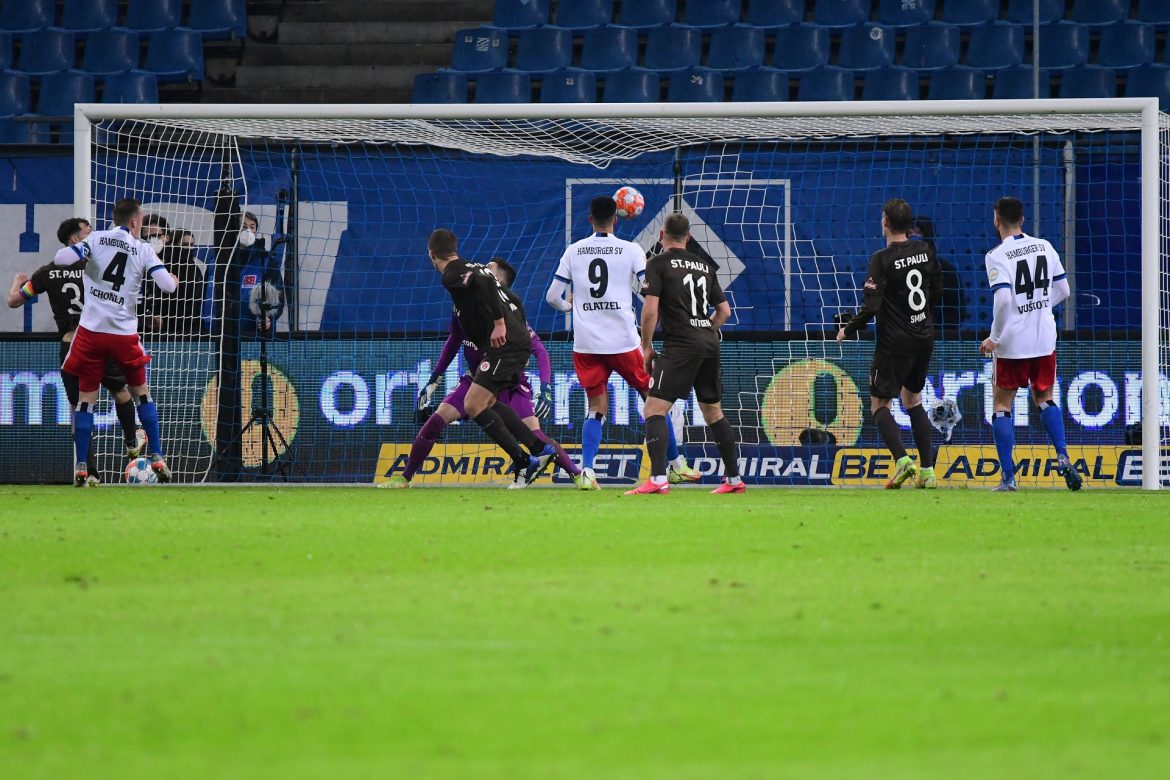

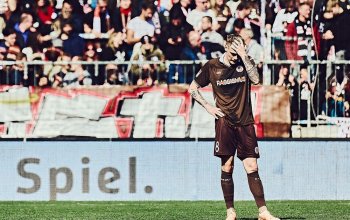
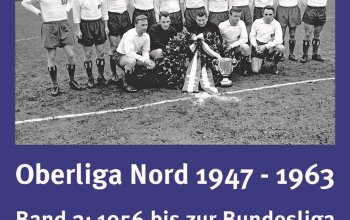
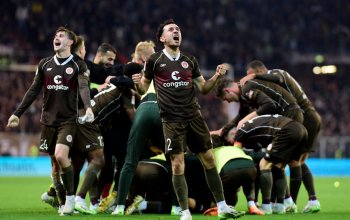
Hi Tim,
Danke für deine Analyse. Mal wieder richtig gut und wichtig.
Der letzte Abschnitt besonders für mich.
Wahnsinn dass du dir das Spiel gleich noch einmal anschaut hast.
Das hätte ich nicht geschafft. Zu tief sitzt der Frust und Ablenkung die beste Medizin.
Ich muss schon zugeben dass nach dem Abpfiff das Frustlevel schon sehr hoch war und die Angst vor der obligatorischen schlechten halbserie nach einer guten sehr groß war.
Deshalb danke für die sachliche Einordnung.
Und richtig: es ist alles möglich!
Mir ist die Einordnung zu optimistisch. Weniger bezogen auf das Spiel gestern – die anderen waren wirklich gut. Vor allem aber wollten sie mehr. Und das ist, was mir Sorge macht, seit einigen Spielen: Das Empfinden, dass uns in der Liga der entscheidende „Punch“ abhanden gekommen ist, ob mit oder ohne Kyereh. Und das Gefühl, dass das vor allem etwas ist, das uns im Kopf abhanden gekommen ist: Wachheit, Kreativität, und ja, Bereitschaft, immer noch eine Schippe drauf zu legen. Das war über weite Teile des letzten Jahres anders, seit Ende November sehe ich das nicht mehr. Zur Zeit träume ich deswegen von nix mehr.
Seh ich leider genauso. Das ruckelt sich jetzt langsam tabellarisch zurecht, am Ende werden es D98/SVW/S04/HSV unter sich ausmachen, dann kommen noch Heidenheim/Paderborn/FCN, wir landen auf 8. Würde das auch gerne so positiv wie Tim sehen, allein mir fehlt da zuviel seit einigen Spielen nun schon ( klar, Dortmund ausgenommen). Die Rückkehr von Kofi mag zunächst mal noch nen kleinen push geben -allerdings: die Offensive beim nächsten Gegner Paderborn lässt mich da schon zweifeln…- aber grade auch die Auswärtsauftritte haben meinen Glauben auf zumindest den Relegationsplatz arg schrumpfen lassen.
Ja, ist sicher nicht die beste Phase. Und ja, das zeigt auch die Statistik ziemlich deutlich, der FCSP hat in der Hinrunde über seinen Möglichkeiten gepunktet. Wichtig ist aus meiner Sicht, wie die nächste SPielphase (bis zur nächsten Länderspielpause) läuft. Da kommen Gegner, die das Prädikat „musst du schlagen, wenn Du aufsteigen willst“ tragen. Wenn es da ein-zwei gute Spiele gibt, dann wendet sich das Blatt wieder ganz schnell. It’s a lot about confidence.
Ich denke, dass ich das ein bisschen entspannter sehe. Wir dürfen nicht vergessen, dass wir in der Phase im Herbst so stark waren, weil die Gegner auch entsprechendes Level hatten (Ingolstadt, Rostock, Dresden, Sandhausen). Ich würde mal behaupten, dass in der oberen Tabellenhälfte jeder jeden schlagen kann und es daher am wichtigsten ist, die Spiele gegen „die von unten“ zu gewinnen (dazu zähle ich Kiel übrigens nicht).
So Dinge wie Wachheit, Kreativität und Bereitschaft find ich immer ganz schwer zu bewerten. Wie misst Du Wachheit? Woran machst Du das fest, dass die fehlt? Ich denke ich verstehe zwar genau was Du meinst, aber es ist halt nicht messbar, daher möchte ich gerne mal wissen, wo du da Linien ziehst.
Als Beispiele würden mir etwa die beiden Aktionen von Smith und Paqarada einfallen, dir du erwähnst. Die hätte es im November nicht gegeben. Oder das Wiederaufleben dieser individuellen, ich will es noch nicht einmal Aussetzer nennen, Nachlässigkeiten in der Defensive, die eine eigentlich stabile Abwehr doch immer wieder untergraben und in der Summe dann doch zu unnötigen Gegentoren führen. Und eine Luschigkeit in den Aktionen nach vorne, die ich – ob berechtigt oder nicht – schon immer besonders mit Buchtmann verbunden habe, die sich aber wieder insgesamt einschleicht: der Pass ist minimal zu langsam, einen Tick falsch getimet, ein wenig zu ungenau. Das passiert natürlich, aber es gab Jahre, da hatte es bei uns System. Dann war das weg, für mich einer der zentralen Bausteine unserer erfolgreichen Phase. Jetzt ist es wieder da.
Dass im Laufe der Saison auch eine schlechte Phase kommt, war eigentlich klar. Und ja, aktuell kann die Mannschaft in der Liga auf dem Platz nicht immer unseren (schon gestiegenen?) Erwartungen entsprechen.
Trotzdem ist weiter Alles drin. Das ist doch schon mal mehr als in den locker 10 Jahren davor. Forza!
So sieht es aus! Wichtig wird, wie das Team aus dieser Phase herauskommt
Vielen Dank. Ich war gestern auch nicht enttäuscht, denn der HSV war in den Offensivaktionen zumeist klarer und ein Stück weit gefährlicher.
Kleine Ergänzung: Ich fand, dass Vasilj durchaus bei beiden Gegentreffern etwas unglücklich war, während Heuer Fernandez einige sehr gute Szenen, insbesondere fussballerisch hatte. Auf der Position hat sich das Spiel aus meiner Sicht dann auch entschieden.
Ja, Heuer Fernandes ist sicher der beste Fußballer auf der TW-Position in der 2. Liga und da kann Vasilj nicht mithalten (auch wenn ich ihn nicht als fußballerisch limitiert bezeichnen würde, aber Heuer Fernandes spielt schon ganz andere Pässe).
Hallo Tim,
mit den Adjektiven „sympatisch … stets freundlich … charmant … freundlich“ triffst Du
den Nagel auf den Kopf. Danke fuer Deine inhaltslose und oberflaechliche Analyse.
Gruss Michael
Hehe, danke!
Es gibt kaum eine bessere Saison als diese, einem möglichen Derbyfluch aus dem Weg zu gehen!
Spiel abgehakt und Danke für den Bericht!